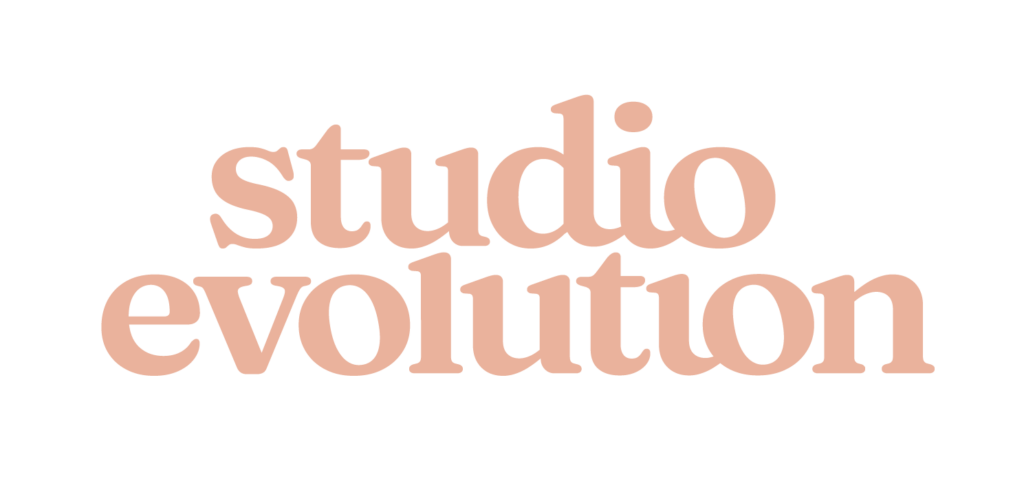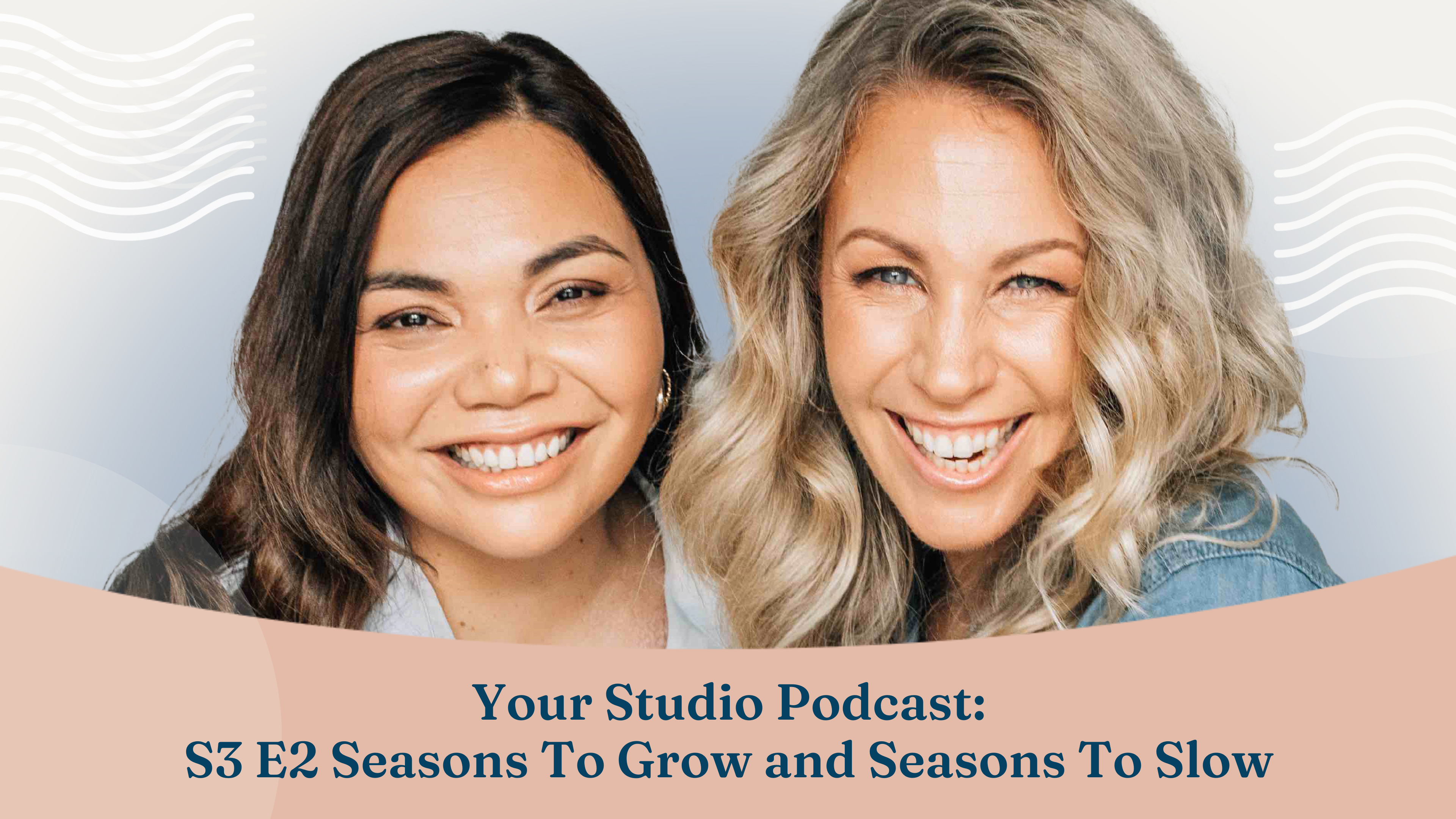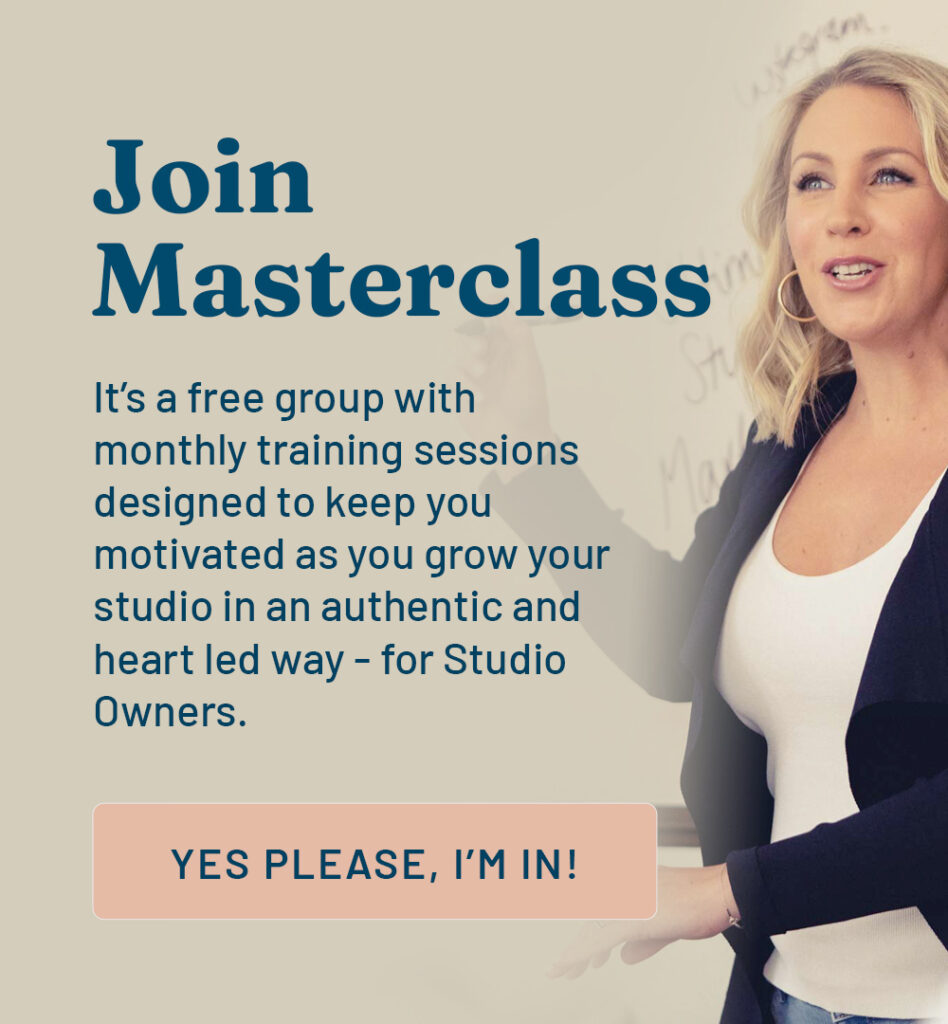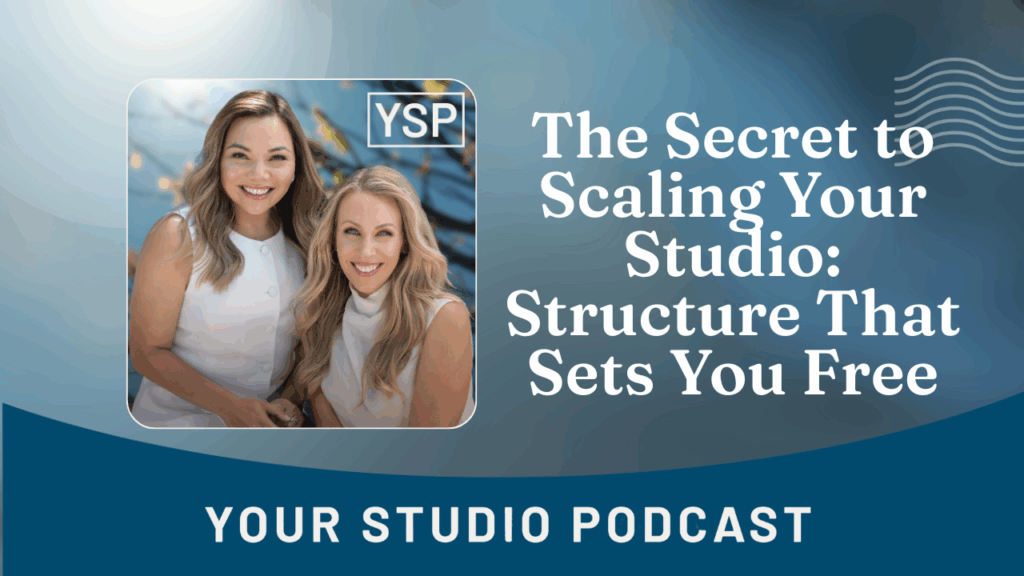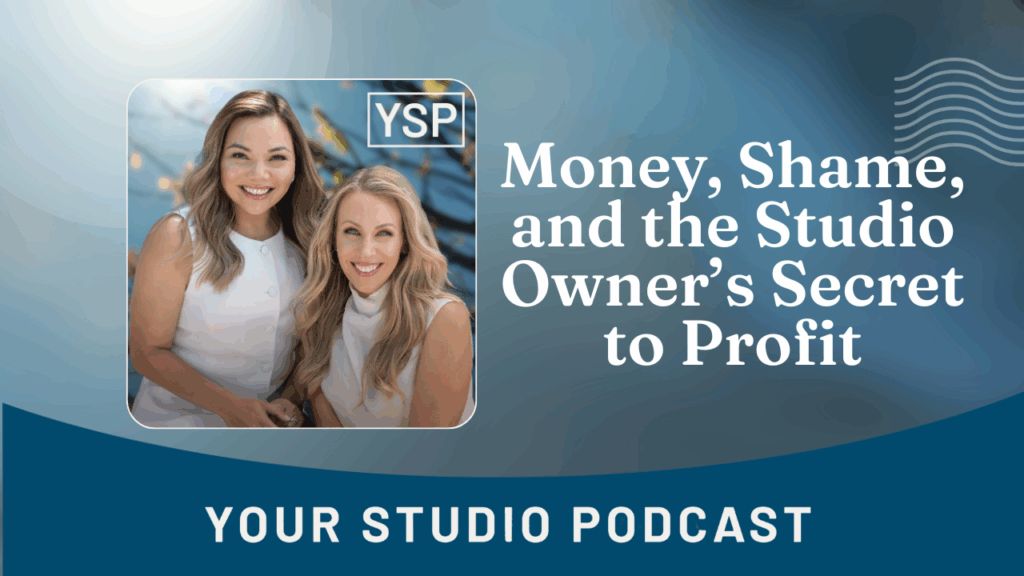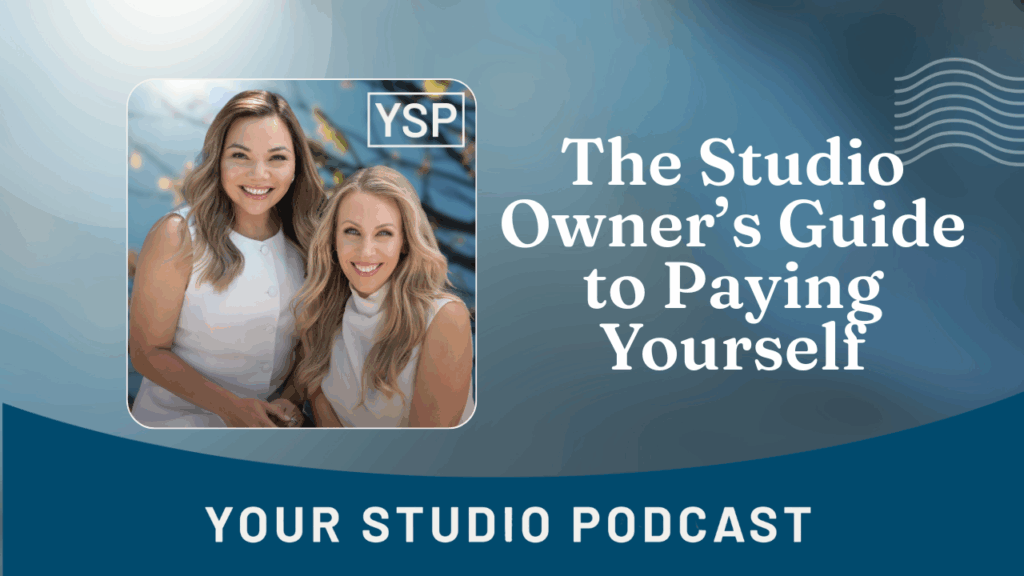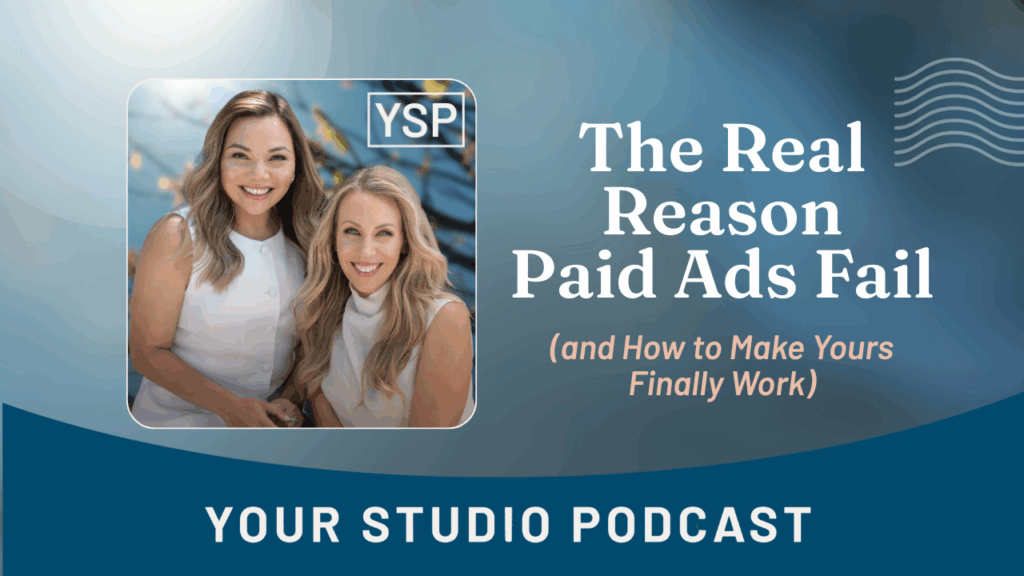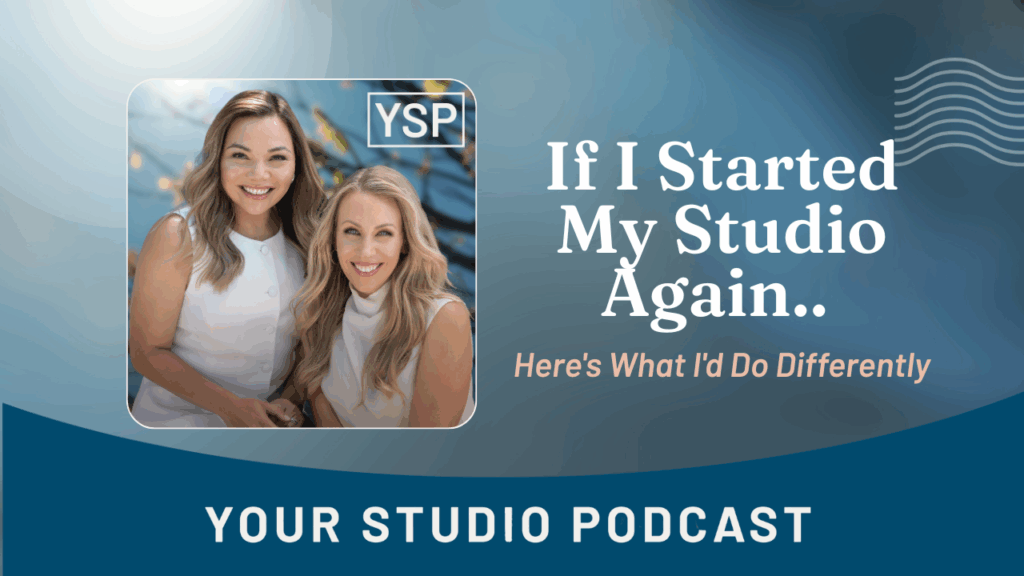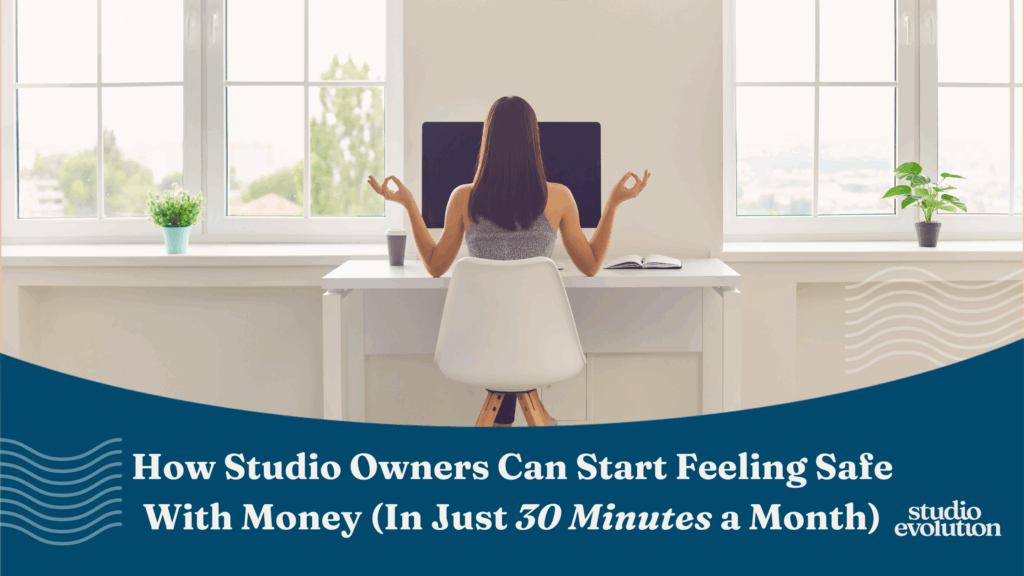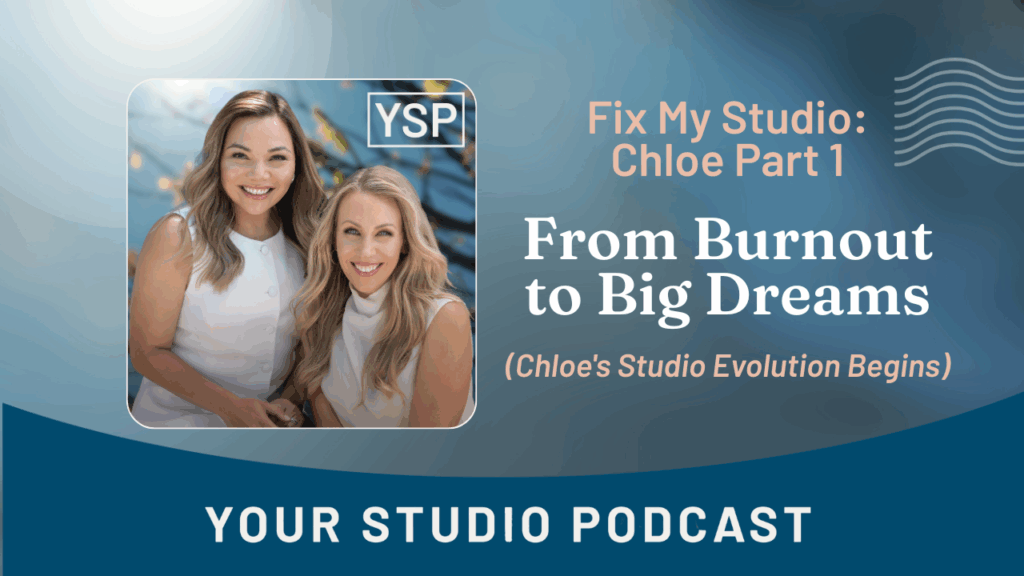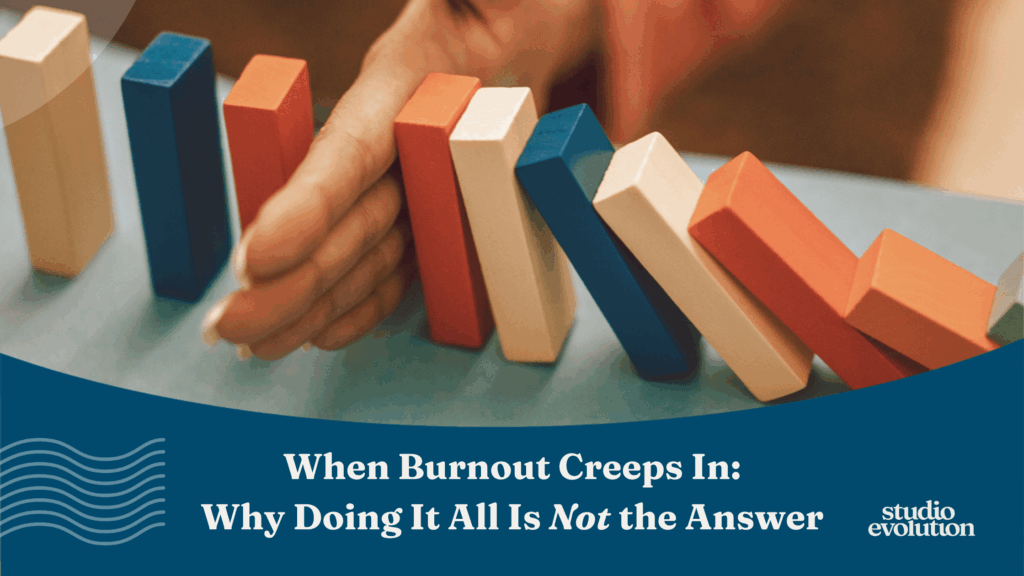Not every season in business is about growth – and that’s where the real wisdom lies. In this heartfelt episode, Michelle and Chantelle open up about the lessons they’ve learned through seasons of hustle and seasons of slowing down. If you’ve ever wondered whether it’s time to push forward or pause and realign, this conversation will leave you feeling seen, supported, and ready to embrace the season you’re in. 🌿
Please make sure to subscribe and review if you like what you hear!
If you’ve got a studio problem you’d like us to solve, leave us a voicemail here: https://www.speakpipe.com/LeaveEvolutionAVoicemail
Be sure to follow us for more content perfect for Studio Owners!
Instagram: @thestudioevolution
YouTube: @thestudioevolution
Facebook: @TheStudioEvolution
And if you’d like some more support, find out how we could help you here:
Website: studioevolution.com/start
Transcript:
Michelle Hunter (00:48)
Hello friends and welcome back to the Your Studio Podcast. It is Michelle Hunter here and I’m here with my work wifey, Chantelle Bruinsma How’s it going Chantelle?
Chantelle Bruinsma (00:56)
Hey friends,
so good. We’re gonna have a bit of a deep and meaningful bit of a D&M today, I think, aren’t we, hun?
Michelle Hunter (01:02)
completely. And we kind of came to today’s topic because we were doing some reflecting and it’s just wild. It’s crazy. Chantelle and I were just having a chat that we have just sold out of our third Horizon House event and we’re still five months away from Horizon House taking place in Thailand this year.
Chantelle Bruinsma (01:22)
It’s a big deal. So Horizon House is
where we take about 15 studio owners on an incredible five day experience. It’s probably one of the most expensive things in the industry because of the level of experience we want to give and you stay in this incredible house and we give like life changing experiences. We do all the lots of fun things and then we do a lot of real deep work on strategy of your business and the fact that
We’re going to Koh Samui with the most spectacular group of studio owners. It’s a big deal for us, huh? It’s a really special privilege.
Michelle Hunter (01:53)
it is such a privilege and it’s kind of like a pinch me moment that these studio owners are giving themselves this gift and choosing to spend like, let’s get real, a week of their time away from the studio, working on their business with us. It is a real privilege.
Chantelle Bruinsma (02:09)
Yeah. And dropping five and a half grand to do so like the investment in themselves and where they’re going. And the most beautiful thing is that I’d say that there are probably eight who’ve come to three, who’ve come to all three. Like once you come to one, like you just keep coming back, which is very, very special. Um, and the theme for this one we’re to do is good to great. Um, we’re going to focus on this group book by Jim Collins, which is my favorite book of all time, but we’re going to take the perspective of good to great in marketing. So your marketing is pretty good.
Michelle Hunter (02:19)
Yeah.
Yep.
Hmm.
Chantelle Bruinsma (02:38)
but we’re gonna make it really great over these five days together.
Michelle Hunter (02:41)
Yeah.
It’s going to be so awesome, Chantelle. And, you know, it’s got us thinking, there’s seasons in our life, right? Season in our personal life and there’s seasons in our business and like these studio owners, they’re really taking this opportunity to make their marketing and their studio good to great. And we’ve been through some seasons, haven’t we Chantelle, of when to lean in, like these studio owners and really lean in to get more. And sometimes there’s seasons where we’re not
Chantelle Bruinsma (02:59)
Mmm.
Michelle Hunter (03:10)
We’re not leaning in at all.
Chantelle Bruinsma (03:12)
Yeah. I mean, there’s times when the growth just happens easily in your studio and you’re like, the students is pouring through the door. And then there’s other times when it’s crickets and it can be very frustrating to be in the different seasons of business, whether you’ve kind of got this lovely surge of growth or then when it’s really quiet and knowing what to focus on in, the different seasons to get to where you want to be. And sometimes, I mean, we’ve kind of had this experience too, where we’ve had too much growth. have had huge growth.
in studio
Michelle Hunter (03:42)
Yeah.
Chantelle Bruinsma (03:42)
evolution and it has got to the point of being pretty exhausting and relentless to manage, right? So it’s kind of again, like there’s pros and cons to each season. Like winter is cold and dormant, but it doesn’t mean that it’s less productive. Actually the thinking, the systems, the design work you’re doing in the winter phase of business cycles sets you up for the whole new spring and summer. And as a company where we’ve come off about a three year winter stage and where we can really feel like we’re
deep in spring right now.
Michelle Hunter (04:13)
That’s right. And if we could be completely transparent, Chantelle, we’ve been, you’ve been around the traps. You’ve been doing this for 14 years and I’ve been with you here by your side for almost nine. And there’s been a lovely evolution of seasons as a company. And sometimes, you know, we went through an experience like 2019 with growth just kind of exploded in our business. And as you said, it can bring
Chantelle Bruinsma (04:20)
Yeah.
Mm.
Mm. Mm-hmm.
Mm.
Michelle Hunter (04:43)
know, complexity and it can also bring, you know, different problems in a good way. And sometimes that can be tricky to manage.
Chantelle Bruinsma (04:51)
Like we were really just all in on marketing from about 2016 to 2020. We were deep, deep, deep in just marketing was the core focus of our roles and where we put so much of our energy. And like if you’re a studio owner and you want real growth, like that’s where you put your time, right? Everyone knows this, but we had really gone into it. And then I remember that I took the team, we’d done, so we’d kicked some major goals. I took the whole team to Hawaii for a team retreat.
Michelle Hunter (05:19)
Hmm.
Chantelle Bruinsma (05:21)
and we were there mapping out the calendar for the year ahead. Who knew at that stage what was gonna happen in 2020, right? Funny now, but we were mapping out the whole calendar for the year and like just doing the kind of, know, marketing things here, marketing here and delivery things here and courses here and doing this and that. And a lot of them required me to deliver, right? Like I was still very, very much in that phase. And in front of the whole team, I…
Michelle Hunter (05:27)
Yeah, right. Like six weeks later.
Chantelle Bruinsma (05:50)
burst into tears looking at this kind of 12 months ahead just feeling totally just over committed, overwhelmed, overstretched, just like a commodity that I just had to roll out like a perform like a singing monkey, right? And I just was like, I can’t live this life, can’t do this. And, you know, was lucky enough to have a team that looked at me went like, right, not changing, let’s kind of pull back here and.
I’m super grateful for that because it made, we made some really big decisions in that, on that day, actually, I think.
Michelle Hunter (06:24)
We did. We made some
huge decisions. And I think that was a huge turning point where we knew we had to do things differently. marketing was such a focus, was such a core. I came into this company, I cut my teeth on marketing. was amazing. I know everything I know from that big growth period of the company. But we knew at that point it had to be different. And then when we came back, what would you say was the biggest, we kind of like pivoted gears, didn’t we?
Chantelle Bruinsma (06:32)
Mm-hmm.
Yep.
Mm.
Well, we had such growth, our marketing had done very, well and our programs and our retention had done very, very well, but we were still, it wasn’t replicable. And I had this vision of this, you know, these six blinders behind me, I had this vision of an incredibly replicable curriculum that was two years and had all the magical touches and all of the emotional transformational pieces. And, but really systemizing that became the focus because if I knew that if I could really get a structure,
Michelle Hunter (06:56)
Hmm.
Chantelle Bruinsma (07:23)
that was going to work incredibly effectively, it would give such spaciousness for the entire team. They could run it with confidence. We were certain on the outcomes that our students would get once they graduated. And so we kind of pivoted from being very externally focused on marketing to really like, I put a lot of my effort into internally building the systems and the processes and the curriculum and the all the kind of elements that go into that to make this business just.
rock solid and so I mean classic to it wasn’t lesser work but I just kind of pivoted I’d say in some areas right.
Michelle Hunter (07:58)
You did, you was
the same kind of like level of work. And then like, you just pivoted inwards. And what was, you know, let’s be real about our relationship. For me, I was so, you know, I work in a lot of, you know, managing the team and the marketing. And at that time that was really confronting, right? Cause you went from like this marketing machine to like external, and then you’re like, Michelle, I have to get this right. Like, this is the baby. This is.
Chantelle Bruinsma (08:06)
Ha.
Michelle Hunter (08:22)
this is what’s going to serve us long-term, not just in the next 18 months to two years. I fix this curriculum, I get it right. It can be running beautifully. We will then have more spaciousness to return to more marketing and it’s sustainable and it gets results. it was kind of like you had to, because some of us were like, oh Chantelle, it’s a lot, you’re doing a lot, but like, if you fast forward now to where we are, it has been the biggest gift of the company.
Chantelle Bruinsma (08:24)
Mm.
Yes.
Michelle Hunter (08:49)
was focusing on those six binders right behind you.
Chantelle Bruinsma (08:52)
Well, I knew that because you cannot sustain perpetual growth without it’s like, can’t have growth growth growth without growth in systems. Like otherwise it all goes like a house of cards and goes to shit. And you guys know businesses that have grown really quickly, but their retention is terrible. Their onboarding is terrible. Their team dynamic is terrible. Like I’m like, we have to sort this out now. Otherwise it’s not going to be a long-term sustainable company. And if we’re going to do it, we get to do it bloody right. And so I was, I felt it was worthwhile.
Michelle Hunter (08:59)
Yeah.
Yeah.
Yeah.
Chantelle Bruinsma (09:22)
pivoting gears. And the funny thing, like we made that decision, right? And then 2020 was the biggest year ever for our company. Like we doubled in 2020. Like we served so many studios during COVID and we kind of just really supported the industry. had this massive growth that was again, like tricky to navigate because it requires so much to make sure everyone’s experience is really good. That was tricky too.
Michelle Hunter (09:27)
Mm-hmm.
Yep.
So that
is really tricky. And what was the cost of that?
Chantelle Bruinsma (09:52)
it wasn’t small. No, I mean, like, that’s also kind of put into context that I had my second child in September, 2020. So I was pregnant kind of, you know, really, serving. But so, you know, when, when she was born, the awesome kind of thing was, I mean, I had built such strong systems by this point.
Michelle Hunter (09:53)
It wasn’t small.
Yeah. Yeah.
Chantelle Bruinsma (10:20)
and in the kind of the kind of probably the two years after that like when she was about one by the time I got she was about one year old everything was really dialed in like the systems for delivery were set and there came a point when I think I was just so burnt out from my youngest didn’t sleep she had some medical situations and she didn’t sleep more than two and a half hours for three and a half years if you see these lines here that’s that’s that’s from the past four years of my life
Michelle Hunter (10:43)
along.
Chantelle Bruinsma (10:48)
but what was the best thing was that I was able to really step back and just heal and kind of reset, only my values perspective, but just like priorities here. And the business has been rock solid. Our revenue has been rock solid and I have worked a fraction of what I used to work and the company has been rock solid. So I am someone who has lived experience of when you take the time.
Michelle Hunter (10:58)
Mm.
Chantelle Bruinsma (11:16)
to build the systems, to build the structures, to build the team, that means you get freedom. And now it’s kind of fun. Like we’ve sorted out my daughter’s sleep. She’s doing so well in her health. And we’re on this really kind of new chapter of stepping into external marketing. And right. Like we’re really kind of on a ramp up stage there. We’ve got a full-time marketing manager because everything’s so stable. The company and the team are so set that we can now go to a whole nother phase of growth.
with confidence and that’s the difference.
Michelle Hunter (11:48)
And it’s completely different. And when we talked about those, seasons, right? Like the beginning was a season of lots of marketing, lots of momentum. And then there was a season, as you said, you had to heal and rest. We were really fortunate that from that early momentum, it sustained us. So, you know, there’s times when you’re not going to always be going in full pelt ahead and you physically can’t, but what you do in certain seasons and if you handle it, you know, well,
Chantelle Bruinsma (12:05)
Hmm.
Yeah.
Michelle Hunter (12:17)
you can let those foundations and systems continue and that growth that you had at the beginning sustain you through the winter.
Chantelle Bruinsma (12:24)
Yeah, for sure.
Like if you really kind of can get to a point where you have really stepped your marketing up to a very good presence in your community. Like I would say that in the industry, our positioning has been so strong and we had four years that were just like absolutely off the charts, right? And then we had four years where I kind of wasn’t able to sustain that. And it was a good thing to do that too, right? That was the best thing for me. It’s been wonderful. But those four years have carried us.
Michelle Hunter (12:41)
Yep.
Mm-hmm. Yep. completely. That’s the best thing.
Chantelle Bruinsma (12:52)
Right? So again, like this is the seasonality. You have to catch your breath, particularly as women. We are cyclical beings, There’s peak seasons and there’s rest seasons. And it’s fun to be in a flow where you can really step into, okay, where are we going now? What is this place? And I have to acknowledge you, Michelle, and the whole home team. You guys gave me the space to rest. I did need it. I did need it. And you didn’t put any pressure on me. It’s amazing.
Michelle Hunter (12:53)
Yeah. Yep.
Mm-hmm.
You,
it was, you really needed it. There was no other, there was no other. I wasn’t going to push you back in any capacity. And you know, that’s what any friend would do in a situation like that.
Chantelle Bruinsma (13:24)
you
I mean, I remember that Tuesday,
it was a Tuesday afternoon and I kind of had a bit of a breakdown earlier that day and it had been a rough kind of couple of months, but I was just kind of like really struggling with sleep deprivation and like some mental health things. And I called you at two o’clock and said like, I can’t work, I can’t do this. And there was no handover, there was no planning spreadsheet, there was no pre-recording of marketing materials, there was no briefing of the team, what we’re gonna do with clients. I literally was like,
I’m not able to work. And Michelle, you just ran the company for six months that I just kind of had to go and do my thing and get my shit together. And you just took it on, which is again, just, still can’t quite.
Fathom how you did that would have been so tricky.
Michelle Hunter (14:26)
I would do it today. I did it yesterday, I would do it tomorrow. But you know what? I have to look at that. That was a huge leadership piece for me as well. I grew so much as a person and as a leader in that six months. And it was a real opportunity. The team was so united. Like we were so united in loving you and wanting to support you to come back to do what you love, but in your time. So we really just united as a team and the team just made it really effortless to do.
Chantelle Bruinsma (14:30)
No.
Wifi.
Mm.
Mm.
Hmm.
Yeah.
Michelle Hunter (14:56)
sure
there were crunchy moments, but it really was an opportunity for me to step up as well within the company. And this is before I became a co-owner. it was, I was general manager at the time. So it was a growth opportunity for me as well.
Chantelle Bruinsma (15:13)
Yeah, I mean, how you were so generous in that time was no small kind of contributor to like, I want to just do this with you. I don’t want to do it alone. And I think that was probably the biggest shift for me afterwards is again, and having been through that experience, having got to absolute rock bottom of can I do this? I don’t think I can do this anymore. Like it’s too much. It’s too big. The team’s too big. There’s too much on my shoulders. And I, I grappled with
I don’t even know if I can do my job anymore. For a good six months, I was like, I don’t think I’ve got it in me. I’m not leading to the level I need to be leading at. My team deserve better. All of that real deep soul searching of, can I do this? Do I want to do this? Am I able to do this? When you’re in a really hard time, it’s hard to of see the forest for the trees. And then there was that moment, that one morning where I woke up, I like,
Michelle Hunter (15:45)
Mm.
show.
Chantelle Bruinsma (16:12)
what if they ran it with Michelle and it was like, And it was the greatest thing ever. But we had to really get to a place of now finding equilibrium in the internal and the external. I think that we’re in a good spot for that now, we really are.
Michelle Hunter (16:30)
we are. And Chantelle, if you’ve got a studio out there listening to this, because I know that they’ve either grown too quickly or they’re in that season of the winter and they’re in the depths of it. What advice do you have or, you know, of just holding on?
Chantelle Bruinsma (16:40)
Yeah. Yeah.
Poof,
holding on.
Do you know what’s interesting as you say that? I kind of tend to think my advice is to not hold on in a particular way. Like stay with me, stay with me. So when we’re holding on, it’s because we’ve done things in a particular way for so long that we’ve been used to doing them. And I had to get to the point of being able to let go and not hold on to how I’d been doing them and to shift my entire relationship with what work gets done and who does it and.
Michelle Hunter (17:01)
Okay. Yep.
you
Chantelle Bruinsma (17:21)
I had to kind of ride. So it was not holding on. was, had to fucking learn to let go. Something that my personality has not found easy. And it was probably having six months off that allowed me to, and I know that was, there’s privilege in that, right? I’m not, like not everyone’s in the position where they can just like see ya team, have fun by, I’ll see you in six months. Like I’d worked for over a decade to really build a system and build a team that could do that. And so I know how fortunate.
Michelle Hunter (17:23)
That’s big.
Yeah.
Yeah. Yep.
Chantelle Bruinsma (17:51)
I am to have had that backing. having that space to like, know what? I can’t continue going this way. I cannot continue delivering in this way. It’s not sustainable. So just let it go. And that’s when the creativity comes. That’s when the permission piece, we could do it this way. Or that person could help with that. Or I could run it with Michelle. I probably don’t even need to do that. But it doesn’t even matter doing it that way. It’s just like, we gotta shed.
shed that old identity of like the over delivery, the over responsibility, kind of find the cleanliness and the freedom and the space in how you can do it in a new way. And that’s what I worked really hard to be able to get to do.
Michelle Hunter (18:27)
You did.
And it’s actually been revolutionary to the company and how you’ve come back and how we approach things. And it’s hard though. It’s hard getting rid of all that conditioning. It’s deep work. It’s deep work to let it go.
Chantelle Bruinsma (18:44)
It is really deep and like I guess from your perspective, like when you are seeing, you know, a studio owner, let’s say, who is kind of giving it their all, but just doesn’t seem to be getting any traction, right? Like that kind of feeling of like, I am just, you see this, they’re just putting everything in, they’re putting everything in. What do you think, Michelle? Like from like, from what I’ve just said, but like, what else do think is actually really important to giving them that new start?
Michelle Hunter (18:52)
Mm-hmm.
Well, you know, there’s one thing I know with studio owners and when we speak to a lot of them, they feel extremely isolated and there’s, you know, they often either have a partner or, you know, close family and friends who are on that journey with them, but don’t like truly understand, you know, what they go through when they say like such a situation that’s so specific to being a studio owner, you know, their loved ones with all good intentions, like, yeah, yeah, but I don’t think they truly get it.
Chantelle Bruinsma (19:20)
Mm.
Don’t get it.
Michelle Hunter (19:39)
And where I’ve seen how to let go of lot of that conditioning is, I think it’s like coming together in community with people who understand and get you and can help you do some of that work. Because that’s where we’ve seen some of the biggest transformations. I know a lot of studio owners who are still operating in isolation and not being connected in some way. And it’s hard. And they’re on that hamster wheel. And you just keep on going.
Chantelle Bruinsma (19:59)
Mm.
Michelle Hunter (20:09)
And it’s really hard to break that cycle because it’s confronting. One, it’s confronting to do the deep work. And it’s hard to trust and to go into community of finding like-minded people who actually understand you.
Chantelle Bruinsma (20:13)
Mm.
And the worst thing about this whole situation is that it’s us, right? It’s, kind of like the mirror. It’s like when you have to hold up a mirror to go like how I am relating to this business, how I am setting the own structures, how I am creating my own kind of constraints and like doing things manually and not using a lot of automation, how I’m kind of resisting delegating. Like we keep ourselves chained, right? And I’m totally guilty of that.
Michelle Hunter (20:28)
Yes.
That’s it.
Yeah.
Chantelle Bruinsma (20:54)
I, I, it’s funny at the moment. in these companions, each one has, six massively designed strategic companions, like six kind of strategy handbooks, if you will, in each of these binders. They’re not just empty. They’re chock a block full of stuff, right? Like there’s this much. And so I’ve written six of them and, I wrote them all, but now we’re doing some tweaks and it’s only been like this year, this year that I’ve delegated.
all of that process and our teams done it and f*ck they’ve done a great job they have just absolutely I’m so in awe of what and I was like Chantelle you could have…
Michelle Hunter (21:26)
Amazing job.
Yeah.
Chantelle Bruinsma (21:35)
done this like four years ago…But I didn’t get there, right? I wasn’t there yet. I wasn’t there yet. Baby Chantelle didn’t know how to kind of fully let go something that I cared about so much.
Michelle Hunter (21:37)
That’s right, that’s right. Yep, yep.
so deeply and it’s cause you care and it’s cause they care as well. Studio owners love so much, right? And it’s hard when someone holds a mirror and shows you that there is another way, that there is another way. And you know what’s fascinating Chantelle like we’re so privileged that we’re now, we get to work together, right? So we are like constantly bouncing and holding a mirror. And before we became co-owners, you know when…
Chantelle Bruinsma (21:49)
Mm.
Mm.
Michelle Hunter (22:10)
It was really fascinating. used to say, I know when Chantelle had been in connection with her mastermind group or, you know, a little business bestie group, because you would come back sparkly eyed and full of ideas of how, what other way could it be? And I think that is, there’s something really valuable in that when, when you don’t have that kind of bouncing around and it can sometimes just stay up all in here.
Chantelle Bruinsma (22:25)
Yeah.
Hmm. You know, so we have a manifesto for studio evolution. It’s called the seasons of evolution and it’s kind of a walkthrough of the process really that is that it’s transformation, you know, where our intention, our whole company is called evolution and that we will evolve your leadership and your profitability and your systems. Everything is going to evolve into a whole new level of itself. But the first part of the process is called the awakening of potential. And this is where you kind of go like,
Michelle Hunter (22:45)
Hmm.
Chantelle Bruinsma (23:05)
I had no idea that you could structure your pricing this way. I had no idea that you could do marketing this way and it just works. I had no idea that this system would save me 10 hours a week. I had no idea like that awakening to, hey, there’s another way of doing things, right? And so there’s that spark of inspiration and you need that. And often you need that from external source. Like the reason you stay stuck on hamster wheels is because there hasn’t been that kind of like spark of identifying a new way of doing things.
Michelle Hunter (23:30)
Mmm.
Chantelle Bruinsma (23:34)
And then we move around the next season is called the nourishing of foundations. And this one isn’t as active. It’s kind of not as springy. It’s more of a winter season. And this is where we actually slow the thinking down and just really make very smart, long-term, sustainable decisions. How is this going to work in 10 years from now? Like if we had, you know, tripled the student volumes, would this process, would this system be able to cater to that?
and what would be the best solution for this level of growth? a really kind of, really getting clear on deep, deep thinking and strategy for the long-term, absolute holistic success. And then once you’ve done that thinking, because like, what happens is that people get an idea and they just run. And then they run too fast. They’re not working on the right things. They’ve kind of missed big, big strategic foundations that are really important. So we have to nourish the foundations. We have to make sure that we’re like,
This is really locked in. And then once you’ve done nourishing your foundations, then we like it, then it’s called strides of progress is the next season. And this is like get shit done. Like we are just, go into go mode and we see this transformation of growth in the business. You just start to see this happens to you done, click, bam, bam, because you know what you’re doing. You’ve eliminated all the obstacles. You’re not questioning anymore. You just kind of moving forward. And that’s so fulfilling, so rewarding and fulfilling and, and positive.
And then the final season, the fourth season is kind of like the harvest season, if you will. And so this harvest season is called Ripples of Liberation. And this is where you actually kind of look around and you get to the point of like, my gosh, it’s just working. Like your retention because you’ve kind of worked out a retention strategy, now the students are just retained. And because you’ve actually done an onboarding process, your word of mouth is just exponentially taking off.
And because you’ve kind of really got the right pricing model, you’re profitable for the first time ever. Like we’ve done the deep thinking and that creates such growth, but you don’t get there without the season of winter. You don’t get there without the summertime kind of, you know, prolific starts. There’s this requires change. And so adopting that model of thinking for us has actually given me a lot of freedom too like, it’s okay to really slow down. It’s okay to rest.
Michelle Hunter (25:50)
Mm-hmm.
Chantelle Bruinsma (25:59)
and reconnect with your why for doing this, for your vision of where we’re gonna go as well. It’s really important. But then also, from your perspective, Michelle, I think how do you relate to that, like in your role?
Michelle Hunter (26:15)
Well, I think it’s also giving us the permission as well. It’s like, is the opportunity again, to lean in as well with momentum and you know, it’s okay to press the go button as well. Like there’s times that I love a go button and then I love.
Chantelle Bruinsma (26:30)
You love a go button. You love a go button. You do. You’ve got a very
good button.
Yeah
Michelle Hunter (26:38)
And I think it has been, it’s allowed me as well to really respect the process when we do have to rest and we do have to make considered decisions. And I think that’s a, you when you’re in a different role of not being the visionary, it comes with maturity of really understanding that those foundation, you know, decisions need to be made to sustain the growth of the company long-term. And those seasons really allowed me to respect
Chantelle Bruinsma (26:43)
So.
Mm.
Michelle Hunter (27:07)
those phases, but then also completely embrace the go button when it’s time to go as well. Cause yeah, I love strides of progress. do, I do, but I’ve also gained a huge respect and understanding for the other seasons as well.
Chantelle Bruinsma (27:13)
You have a strides of progress, you love it.
Yeah, I really fully believe that you can’t go to a whole nother quantum leap of growth without a full reset of like relationship with the business. You can’t go from 100 students to 400 students without real like personal transformation and a system transformation and a marketing transformation. Like it rarely happens unless we actually have kind of
awakened to like, okay, I see this level now and here’s how we’re to do it with the nourishing of foundations. This is how I’m going to run towards it. The strides of purpose. And then so you can actually get the liberation. You can actually see this come to fruition in your life. You can’t. And if you’re kind of stuck in a season that feels icky and challenging, there’s a resentment to the studio. You feel just totally stretched thin and frantic all the time. We got to let go. We got to let go of how we’ve done it before and awaken to a whole nother.
potential of what it could look to run this business for you and to find what actually fits beautifully for you.
Michelle Hunter (28:25)
Exactly, exactly. And if you want that opportunity to come and, you know, work and meet Chantelle and I in person, know, Horizon House might not be the forum, but we’ve actually got an upcoming profit intensive and it’s called Elevate. And for three days, Chantelle and I are going to be running a profit intensive and Chantelle, did you want to go into a bit more of the master plan of the profit plan?
Chantelle Bruinsma (28:38)
Mm.
my gosh, I’m so excited. I’m so excited.
I want you to make more money. And in three days, we’re gonna focus on helping your business be profitable. And I know there’s probably already like, cringe like that sounds absolutely terrifying. But here’s the truth. In three days, we’re going to transform your entire business profitability to give you and your family a quantum leap in the life that you live.
and to make this beautiful business of yours, which may have, you you probably deliver the best classes, you’ve probably got a beautiful community, but are you really profitable? It’s possible to have both. And so over three days, I’m gonna teach you the Profit Plan and work with you. It’s a beautiful kind of small group. We’ve only got to actually, like I think six seats left, I think. We’re kind of, we’re nearly kind of at capacity friends so jump in quick. We’re gonna really make sure that you’ve got all the foundations you need.
Michelle Hunter (29:33)
Yep. Yep.
Chantelle Bruinsma (29:42)
to have the financial liberation. But many studio owners are just running so much they haven’t had time to really think about profitability. And so it’s like, it is this hope that my marketing will get more students. What we know for sure is that more students does not equal more profits. We’ve had studios with a thousand students come to work with us because they’re making no profit. They were turning over a million dollars in revenue and how much it was profit? None. They were just breaking even. More students does not equal more profit.
we need to absolutely have a strategy for profit and I want you to have it. And sometimes it’s hard to learn this shit on a Zoom call. Sometimes when you’re doing this really big, deep work, you just need to sit down, have a chat, and actually have someone by your side support you in getting this clarity in what to do in your business. And that’s why I’m just so very excited for Elevate. The whole team is coming in. We’ve got an incredible group of clients and we’re going to get this work connected. It is in New South Wales.
We’d love you to attend. So if you want to go to studioevolution.com forward slash elevate You can grab your ticket, but we do only have a few left So if you’re listening right now, I’d recommend you go and grab it as we speak
Michelle Hunter (30:48)
Yeah.
And you know, when I meet a lot of studio owners at these live events, we only do this Elevate once a year, guys. So this is your chance to, you know, work with us in person for the three days. They said, I’ve always been sitting on the fence about coming to this three day event. And they always say it’s life changing. We even organise a bus. If you’re flying into Sydney airport, we’ve got a bus that takes you down to Peppers. And for those of you who might be bit unsure, never been to one of our live events, it is…
So welcoming. There is no, you know, of like competition or scarcity when you get there. They’re just real studio owners and they are gonna take you in and embrace you and we’re gonna take care of you. And we’re really gonna, yeah, great. Amazing, amazing food at Pepper’s. Yeah, so head to studioevolution.com forward slash elevate, grab your ticket. We would love to work with you in person and just, yeah, help you through your seasons.
Chantelle Bruinsma (31:30)
great food.
That’s it because truly the only difference between the studio owner who is barely scraping by and one who’s profitable is just they’ve got a different plan and in these three days you’re going to get a plan for profitability of your business and if you can learn it this year then next year you’re going to make a whole hell of a lot more profit. year after you’re to make more profit, the year after I get just like the compounding but the sooner you learn this information the sooner you can transform your business and your family’s
financial stability and that is what I really care about and what we are excited to share with you. It’s top level content, deep dive, beautiful fun to be had as well. So thanks for listening lovely ones. Big chats today, but yeah, all real, very real. See you next time. Hope to see you at Elevate. Bye.
Michelle Hunter (32:29)
We’ll see you soon. Bye.
